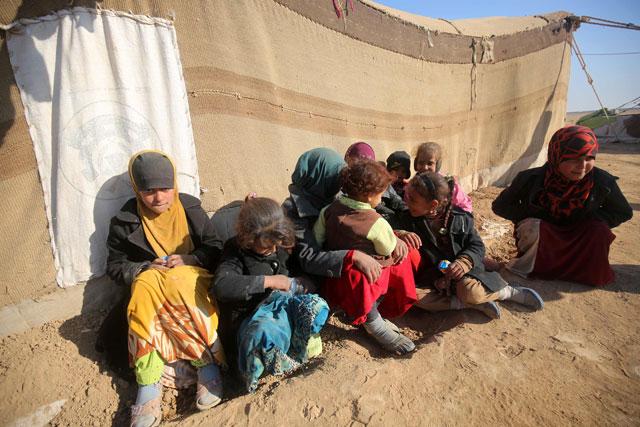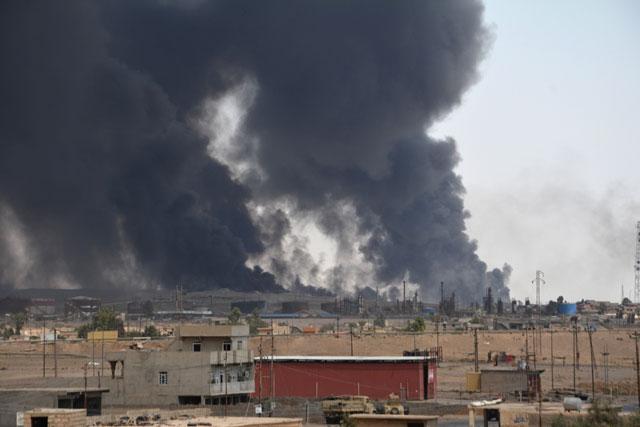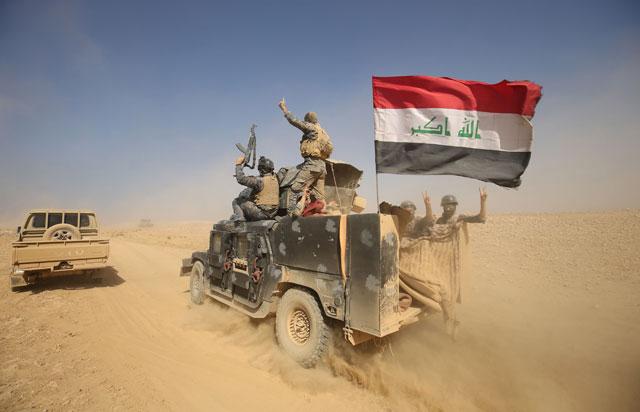You are here
Unlearning the ‘caliphate’ at reopened schools in Iraq
By AFP - Dec 12,2016 - Last updated at Dec 12,2016

Displaced Iraqi children, from the outskirts of the city of Tal Afar, Iraq, gather outside a tent at a makeshift camp on Monday in the village of Khalif Saleh (AFP photo)
JADAA CAMP, Iraq — Huge smiles lit the faces of the Iraqi children lining up outside the newly opened school in the Jadaa displacement camp, for many had not seen a classroom in two years.
The government, the United Nations and their partners are slowly trying to repair the damage done by the Daesh terror group, whose rule had a devastating impact on a generation of children.
Many parents simply refused to send their children to school under the "caliphate" that Daesh proclaimed over around third of Iraq in June 2014.
The extremist group devised its own curriculum and printed its own textbooks, with an emphasis on religion and an obsession with weapons.
"It was all about ammunition, military training and radical ideology," said Sara Hassan, the mother of one of the girls preparing for her first day at school in the Jadaa camp.
After a long hiatus under the often brutal yoke of the extremists, getting the children reaccustomed to school and brotherly group development is a challenge, said teacher Khawla Hassan.
"They are only starting to become focused again and are learning about the appropriate behaviour to observe in class," said the 33-year-old who teaches in one of the camp's tents.
She is from Qayyarah, the largest nearby town and the main hub for Iraqi forces battling Daesh south of Mosul, as well as for the thousands of civilians displaced by the fighting in that area.
Tens of thousands of Iraqi forces launched a massive offensive on October 17 against Daesh in Mosul, the last major Iraq stronghold of the extremists’ crumbling "caliphate".
'Blood and fighting'
According to UNICEF, nearly 3.5 million school-aged Iraqi children are missing out on education nationwide and more than 600,000 displaced children have missed an entire school year.
Khawla Hassan said that when the first classes resumed in Qayyarah, children from the same villages would sit together. She reorganised the classroom and got the children to mix, to "create some fraternity".
An average of 250 children are schooled at the facility in the Jadaa camp every day, although numbers vary as families are displaced and others return to villages that have been retaken by the Iraqi forces.
When the military offensive intensifies, the two schools run by the Iraqi non-governmental organisation NCSON are overwhelmed by a sudden influx of freshly displaced children.
"Yesterday, we had 440 children who were given Arabic and English writing lessons,” said Mohammed Othman, who heads one of the two schools, on Monday.
Maths and science are also on the curriculum, as well as Islamic education, a class Othman says is key to undoing some of the indoctrination some children were subjected to under the extremists.
Other classes were specifically designed to meet the needs of displaced children and teach them the importance of hygiene or how to be aware of unexploded ordnance left behind by Daesh.
Nura Al Bajari, an MP from the province of Nineveh where both Mosul and Qayyarah are located, said resuming education for children who have been out of school was a key stake in Iraq's post-Daesh future.
"These children talk only of blood and fighting. They need classes that focus on human rights and community life," she said.
Related Articles
MOSUL, Iraq — The return of dozens of Iraqi families suspected of links to the Daesh terror group from Syria to Mosul has sparked fears amon
KIRKUK, Iraq — Iraqi forces on Wednesday closed in on the centre of Qayyarah, officials said, on the second day of an operation to recapture
QAYYARAH, Iraq — Extremist leaders are fleeing Mosul, a top US general in the coalition battling the Daesh terror group said Wednesday as Ir













